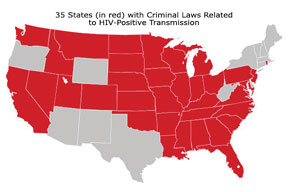 Sex, lies and HIV: When what you don’t tell your partner is a crime
Sex, lies and HIV: When what you don’t tell your partner is a crime
35 States (in red) with criminal laws related to HIV-Postive transmission
By Sergio Hernandez, Special to ProPublica
This story was co-published with BuzzFeed.
(Part VI)
One consequence of the viral exposure legislation is that public health activities and law enforcement, which have traditionally been kept separate, can now overlap. In some states, such as Mississippi, people who test HIV-positive are routinely asked to sign a document called a “Form 917.” By signing it, patients acknowledge they have been counseled about the basics of living with HIV, including the legal consequences of not telling partners they have the virus. Similar forms have also been used in Arkansas, Michigan and North Dakota.
In several states, including Idaho, Missouri, Indiana, Michigan and Iowa, ProPublica found, prosecutors and judges have used subpoenas and warrants to force health officials to hand over these forms along with other medical records, such as test results, as evidence against patients charged with violating viral exposure laws. County prosecutors in Indiana, for example, have served at least 20 such subpoenas to the state health department since 2010.
Sometimes, health officials have initiated criminal proceedings. In Grand Traverse County, Mich., former county health officer Fred Keeslar sent a memo to the local prosecutor head-lined “Recalcitrant Behavior,” suggesting that police set up a sting operation to arrest and prosecute an HIV-positive man suspected of cruising for sex in public bathrooms without disclosing his status. Keeslar did not respond to requests for comment.
On the federal level, Obama Administration officials have come out against HIV-specific criminal laws. In 2010, the White House’s Office of National AIDS Policy issued a white pa-per saying that the “continued existence and enforcement of these types of laws run counter to scientific evidence about routes of HIV transmission and may undermine the public health goals of promoting HIV screening and treatment.” The Presidential Advisory Council on HIV/AIDS has also condemned these laws.
In 2011, the National Alliance of State and Territorial AIDS Directors, or NASTAD, also endorsed the repeal of laws that criminalize HIV exposure or nondisclosure. (Last June, NASTAD also filed a friend-of-the-court brief in the Rhoades case.)
But across the states, health officials have varying opinions. “The existence of the statutes does not affect our prevention, diagnosis and treatment efforts,” a spokesman for the Virginia state health department said. But Jill Midkiff, a spokes-woman for Kentucky’s Cabinet for Health and Family Services, said that “imposing harsher sentences on individuals with HIV or treating HIV-positive patients differently in the eyes of the law may impact the effectiveness of the Department of Public Health’s HIV prevention efforts.”
One consequence of the viral exposure legislation is that public health activities and law enforcement, which have traditionally been kept separate, can now overlap. In some states, such as Mississippi, people who test HIV-positive are routinely asked to sign a document called a “Form 917.” By signing it, patients acknowledge they have been counseled about the basics of living with HIV, including the legal consequences of not telling partners they have the virus. Similar forms have also been used in Arkansas, Michigan and North Dakota.
In several states, including Idaho, Missouri, Indiana, Michigan and Iowa, ProPublica found, prosecutors and judges have used subpoenas and warrants to force health officials to hand over these forms along with other medical records, such as test results, as evidence against patients charged with violating viral exposure laws. County prosecutors in Indiana, for example, have served at least 20 such subpoenas to the state health department since 2010.
Sometimes, health officials have initiated criminal proceedings. In Grand Traverse County, Mich., former county health officer Fred Keeslar sent a memo to the local prosecutor headlined “Recalcitrant Behavior,” suggesting that police set up a sting operation to arrest and prosecute
